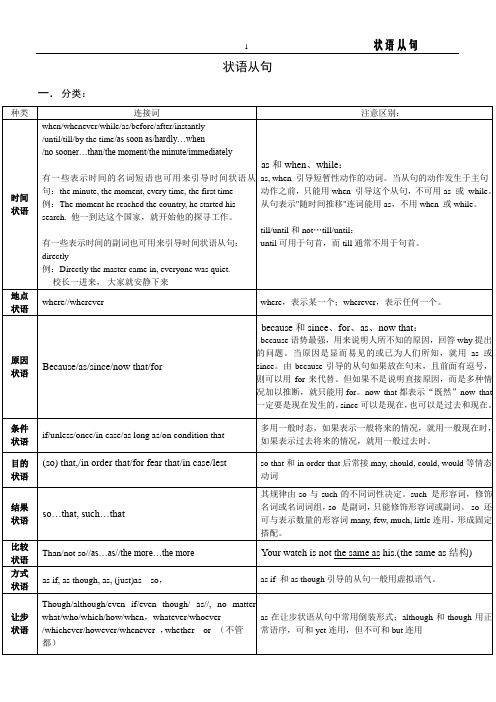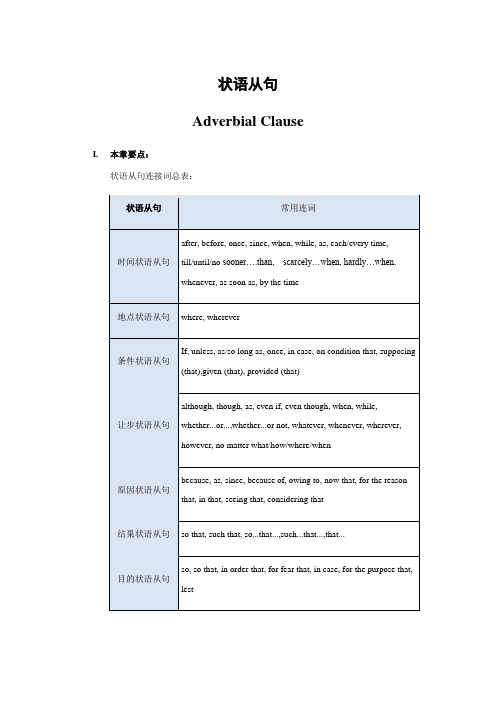no-sooner-than-hardly-when用法
- 格式:doc
- 大小:19.50 KB
- 文档页数:3


高考14种从句用法总复习之状语从句用法状语从句用法状语从句是在复合句中用来修饰动词、形容词或副词的从句。
状语从句共分九种:1.时间状语从句,2.地点状语从句, 3.原因状语从句 4.目的状语从句,5.结果状语从句,6.条件状语从句,7.方式状语从句,8.比较状语从句,9.让步状语从句。
状语从句和其它从句一样都是陈述句语序。
状语从句是历年高考的重点,掌握状语从句的用法对于参加2013年高考的考生至关重要。
第一部分状语从句简明登记表第二部分状语从句的用法一、时间状语从句时间状语从句就是在复合句中,作时间状语的从句。
Every time I fell ill, mother took me to see the doctor. 以前每当我生病的时候,妈妈就带我去看医生。
Each time I go to see Tom, he is always studying at desk. 每当我去看汤姆的时候,他总是伏案学习。
The first time he took part in the competition, he won a second prize. 他第一次参加比赛得了一个二等奖。
【高考连接】【2012全国卷II】⒒ I had hardly got to the office _______ my wife phone me to go back homeat once.A. whenB. thanC. untilD. after 【答案】A【2012安徽】30. When ________ for his views about his teaching job, Philip said he found it very interesting and rewarding.A. askingB. askedC. having askedD. to be asked 【答案】B【2012山东】27. He smiled politely _______ Mary apologized for her drunken friends.A. asB. ifC. unlessD. though 【答案】A【易错提醒】1、主句的谓语动词是将来时、有情态动词或祈使句,以when, before, after, till, until, as soon as, the moment/minute/second, immediately, instantly, directly等引导的时间状语从句中用一般现在时;如果要表达从句的动作已经完成,主句的动作才发生,从句中用现在完成时。

状语从句一.分类:when (当……的时候) while (在……期间) as (当……的时候, 一边……一边……)before (在……之前) since (自从……以来) till/until (直到) hardly…when… (刚……就) as soon as (一……就……)after (在……之后) not…till/until(直到……才)no sooner…than…(刚……就) 地点状语从句:where (在那里) wherever(无论哪里)原因状语从句:because (因为) since (因为,既然) as (由于) for (为了) now that(既然)目的状语从句:(so)that=in order that(以便)so as(not)to (以便[不])in case(以免)lest(以免)结果状语从句:so+adj./adv.+that(如此……以致)so that(结果……)such+n.+that(如果……以致)that(所以,因此)让步状语从句:though/although不可同but连用。
though/although (虽然)however (可是)even though/if(即使)no matter+what/which/where/who/when =whatever/whichever/wherever/whoever/whenever(不论什么/哪一个/哪里/谁/何时)比较状语从句:as (正如)as…as(和……一样)not as/so … as (不如……)than(比……更)the+比较级…+the+比较级(越……越……)条件状语从句:if(假设)unless(如果不)so long as(只要)on condition that (如果)方式状语从句:as(像……那样地)just as(正像)as if(好像)as though(好像)二.各种状语从句的简化方法:1作状语。

倒装句一、定义英语的一般语序是主语在前,谓语在后,如果把谓语的全部或者一部分放在主语之前,这种语序成为倒装。
二、全部倒装▪全部倒装是指将句子中的谓语动词全部置于主语之前,此结构通常只用于一般现在时和一般过去时。
▪▪如果这类句子的主语是代词,则不用写出倒装句。
▪1. 例句分析:Here comes the bus. 表示地点的副词here 放在句首There stands an ancient tower on the top of the mountain. 表示地点的副词there 放在句首South of reiver lies a small factory. 表示方位的短语south of 放在句首Then came the chairman. 表时间的副词then 放在句首Such are the facts. 表语放句首Present at the party were Mr. Green and many other guests. 表示地点的短语Present at 放在句首Gone are the days when women were looked down uopn.表语放句首2. 全部倒装的情况1) 表方位的副词out, in, up, down, away, off的放在句首eg. Out of the room stands a big monster.2) 表示时间的副词now, then 置于句首。
eg. Now speaks the headmaster.3) 表示地点的副词here, there, 以及表示地点的介词短语位于句首时;eg. There lies a big mountain.4) 表语置于句首时eg. Such are what he does.3.注意点完全倒装构成的条件:1)副词或者是表语在句首2)主语是名词,而不是代词3)谓语是come, go, follow, fly等不及物动词试比较Here it is. Here is the book.In he comes. In comes the boy.Here you are. Here are the students.当主语是代词时,不构成倒装。

状语从句Adverbial Clause I.本章要点:状语从句连接词总表:II.状语从句语法点分述:一、时间状语从句常用连接词:1.when 的用法a.“当……时”,两件事情相继发生(从句动作在主句动作之前发生)➢When I receive your email, I will reply soon.♥Attention♥此句为“主将从现”原则,即在时间、条件、让步状语从句中,从句用一般现在时代替一般将来时。
b.(正在……时)突然...was/were about to do...when sth. did......was/were on the way/point of doing...when sth. did...★小试身手★1)The smiths were spending their holidays in Paris _ B__ a terrible tsunami happened.A onceB whenC sinceD while2.while 的用法a.“在……期间”,用延续性动词➢While he was eating his breakfast, he heard the doorbell ring.b.表对比➢Some courses in college are required while others are optional.c.虽然,尽管(放句首,主从句主语为同一人或物)➢While I think living in poverty is bad, I don't care about money.♥Attention♥和although相比,while语气比较弱,比较口语化。
Although正式,语气也强烈。
3.as的用法a.“正当……的时候”(动词可短暂,可延续)➢As they were walking together in the shrubbery(灌木丛)the next day,she said something. ➢As I was going out, it began to rain.b.“随着”➢As she grew older she gained in confidence.★小试身手★选词填空:1)Tom is very outgoing, _____ (when/while/as) Jane is shy and quiet.2)Some people waste food ____ (as/when/while) others haven’t enough.4.before 的用法固定结构:long before+事件(在……以前很久)before long=soon (不久以后)➢Jane had not been gone long before it rained hard.吉英刚走不久就下起大雨。

倒装使用倒装可以简单归结为“闹事”原则,这里的闹事指:N:never,not,hardly等否定词或否定短语谓语句首;A:as引导的让步状语从句调整语序的形式倒装或前置;O:only+状语谓语句首,用部分倒装;S:so,such;H:here,there地点和时间副词至于句首,用完全倒装;I:if虚拟语气中省略if,进行部分倒桩;接下来先说说一说什么是部分倒装和全部倒装,英语句子中,主语和谓语有两种顺序:一是主语在前,叫自然语序。
反之,如果谓语在主语前就是倒装语序,又分全部倒装和部分倒装。
全部倒装是把全部谓语放在主语之前,部分倒装是把助动词,系动词或情态动词提前,剩下的句子主谓不变。
N:否定副词及短语置于句首1.否定副词never,nor,not,hardly,little,seldom,rarely等置于句首,句子部分倒装。
例句:Not until I began to work did I realize how much time I had wasted.直到我参加了工作我才意识到我浪费了多少时间。
2.at no time(无论如何,绝不),under/in no circumstance(在任何情况下都不),in no case, by no means,on no condition,Not.. until, (直到...才),no sooner...than=hardly...when/scarcely...when(一....就...)例句:Little do I dream of seeing such wonderful scenery.我想象不到会看到这样美妙的景色。
A:由as引导让步状语从句要用部分倒装或前置。
句式为:表语/状语/动词原形+as+主语+其他,它只把强调的内容提到句首,主谓并不倒装,其中注意,如果从句的表语提前,且表语是名词,复数或不可数直接提前,后面句子照抄,如果是单数,冠词要省去。
倒装句倒装句的形式根据倒装的形式,倒装可分为完全倒装和部分倒装两种。
1) 完全倒装:将谓语动词全部放在主语之前。
Out rushed a man, with a stick in his hand.一个男人冲了出来,手里拿着棍子。
On the top of the hill stands an old temple. 这山顶上有一座古庙。
2) 部分倒装:将谓语动词的一部分(多为助动词和情态动词)放在主语之前。
Not until twelve o’clock did he go to bed last night. 他昨晚直到十二点钟才睡觉。
Only in this way will you be able to make progress in your English.只有这样你才能够在英语上有所进步。
一、完全倒装的基本用法1. 当here/there, up/down, in/out, now/then, off, away等副词放在句首时,若主语是名词,句子需用完全倒装。
The door opened and out rushed a yellow dog.门开了,一条黄狗冲了出来。
Now comes your turn. 轮到你了。
注意:1)主语是代词时,需用正常语序。
Here it comes.它来了。
Out they went. 他们出去了。
2)该结构中动词一般不用进行时态。
2. 当表示地点的介词短语放在句首时,句子需用完全倒装。
In front of the door stands a big tree.门前有一棵大树。
(To the)south of the city lies a big steel factory. 城市的南部有个钢铁厂。
3. 用于there be 句型中,句子需用完全倒装。
有时be动词可用live, stand, remain,exist, appear等替换。
Adverbial Clause of Time:(时间状语从句)常用连接词:when, while, as, before, after, since, till, until, as soon as, every time, each time, the moment, immediately, the minute, the second…一.when, while, asWhen:从句的谓语可以是延续性动词,也可以是非延续性动词;主/从句的动作同时发生或先后发生。
When I opened the window, I saw him come up.When I was leaving the house, the postman arrived.While:从句谓语是延续性动词;主/从句的动作同时发生,侧重主句动作和从句动作相对比。
While we were talking, he came in.Please don’t talk so loud while others are working.As:从句谓语是延续性动词;主/从句的动作同时发生或一个动作紧接着另一个动作发生。
As I was going out, it began to rain.区别:1.可以互换:如果主句是非延续性动词,而从句是延续性动作的进行时态并表示在一段时间内正在进行的动作时,三者可互换。
When/While/As I was walking down the street, I came across an old friend of mine.2. 不可互换;♣从句动作发生在主句动作之前时,只用whenWhen you have finished your work, you may have a rest.♣.表示“随着……”,只用asAs the election approached, the violence got worse.♣当表示“然而”,只用whileHe likes pop music, while I like classical music.二.as soon as, once,no sooner… than…,hardly…..when……,the moment, immediately, the minute, the second, 大概意思都翻译为“一…..就……”,重点讲解前四个。
法宝07 状语从句目录一............... 知识梳理二............... 真题回顾三............... 名校模拟练法宝07 状语从句状语是谓语的另一个附加成分,主要用于修饰动词的状态,如时间、地点、方式等。
状语从句即为句子中充当状语的从句。
和定语从句不同,状语从句“套路”比较单一,主要掌握不同类型下的引导词,并注意少数特殊情况即可。
01时间状语从句时间状语从句连词after as before oncesince till / until as soon as whenwhile as long as whenever no sooner … than hardly / scarely / barely … when副词immediately directly instantly名词短语the moment the minute the instant the second every time介词短语语by the time- When I arrived home, my mom was sleeping.- 当我回到家时,我母亲正在睡觉。
- As soon as I arrived home, Tom closed TV.- 我一回到家,汤姆就关了电视。
- By the time you arrived home, I had done my housework. - 当你回到家时,我已经做完了家务。
知识梳理在no sooner ... than, scarely / hardly / barely ... when 的结构中,若no sooner, scarely / hardly / barely 位于句首,需倒装。
- Hardly had I finished my housework when you arrived home.- 我刚做完家务,你就回家了。
英语中“一...就...” 的表达方式丰富多彩现将其表达形式及用法总结如下:1、 as soon asas soon as 是最常见的表达方式,前一个as 是副词,后一个as 是连词,引导时间状语从句。
注意:⑴as soon as所指的动作发生在另一分句所指的动作之前。
如:He made a phone call to me as soon as he came back.他一回来就给我打了个电话(回家在前,打电话在之后)。
⑵as soon as引导的从句可以放在主句之前,也可放在主句之后。
如:As soon as he came back he paid a visit to me. = He paid a visit to me as soon as he came back.他一回来就来看我。
⑶as soon as 可用于一般现在时、一般过去时或完成时,主句的动词用现在时、过去时或将来时。
例如:We will go outing as soon as he returns. 他一回来,我们就去郊游。
He started as soon as he received the news. 他一得到消息就出发了。
As soon as I had got on the bus my grandma said“good goodbye”to me我一上车,外婆就向我说再见2、when/whenever/just when在一般人眼里,when这个词就是“…时候”,“在…时候”的意思,其实不然,它也有“一…就…”之意,作连词常常和just连用。
比如:(1) He had just drifted off to sleep when the phone rang.他刚睡着电话铃就响了。
(2) I had just finished the magazine when supper was served. 一读完杂志,饭就端上来(3)I’ll visit him whenever I get the chance.一有机会我就会去看望他。
We all know that there are four seasons in a year.However,life in different seasons is different.In spring,we can see birds making nests in the trees.In summer,people like swimming in the swimming pool because it is too hot.In autumn,leaves fall from the trees.In winter,students usually wear thick winter uniforms.I love the four seasons because they can give me
different feelings.
as soon as, (不倒装)
hardly…倒装when…,
no sooner倒装…than…
(不用表示将来的事情)作者:河工转贴自:本站原创点击数:209
as soon as, hardly…when…, no sooner…than…
三者都表示“一……就”,“刚刚……就”的意思,有时可以互换。
如:
“我刚到公共汽车站,汽车就开了。
”一句,就可以有如下几句译法:
As soon as I got to the bus stop, the bus started.
Hardly had I got to the bus stop when the bus started.
No sooner had I got to the bus stop than the bus started. 但也要注意他们之间的差异:
1.as soon as是普通用法,置于主句前后均可,可以用于各种时态。
如:
I’ll write you as soon as I get there.我一到那儿就给你来信。
(一般现在时)
As soon as I went in, Katherine cried out with pleasure.
我一进门,凯斯琳就高兴的叫起来。
(一般过去时)
I’ll return the book as soon as I have read it.我一读完就把书还回去。
(现在完成时)
Andrew left as soon as he had drunk his coffee.安主一喝完咖啡就走了。
(过去完成时)
注意:as soon as从句谓语要用一般现在时表将来发生的事。
如:
He will ring you as soon as he gets there.他一到那儿就会给你打电话。
1. 使用hardly…when时,主句中的动词若是行为动词则必须用过去完成时,when有时可改用before。
如:He had hardly finished the article when the light went out.他刚写完文,灯就熄了。
若把hardly放于句首,主句要倒装。
如:
Hardly had I finished eating when he came in.我刚吃完他就进来了。
3.no sooner…than表示“刚……就……”时主句须用倒装形式。
如:
No sooner had he arrived than he went away again.他刚到就又走了。
注意:hardly…when,no sooner…than不能表将来的事。
hardly/scarcely…when/before, no sooner…than和as soon as都可以表示"一…就…"的意思,例:
I had hardly / scarcely got home when it began to rain.
I had no sooner got home than it began to rain.
As soon as I got home, it began to rain.
注意:如果hardly, scarcely 或no sooner置于句首,句子必须用倒装结构:Hardly / Scarcely had I got home when it began to rain.
No sooner had I got home than it began to rain.。